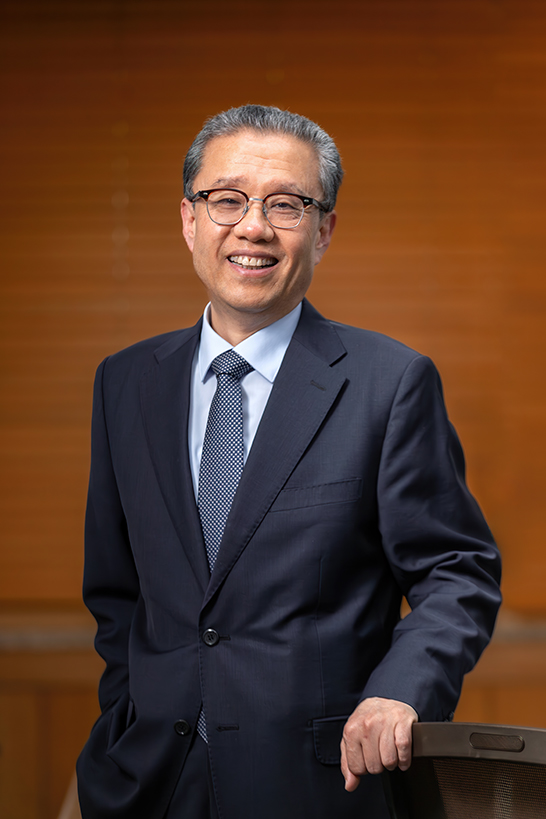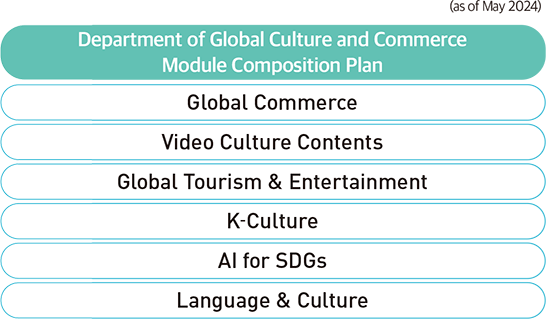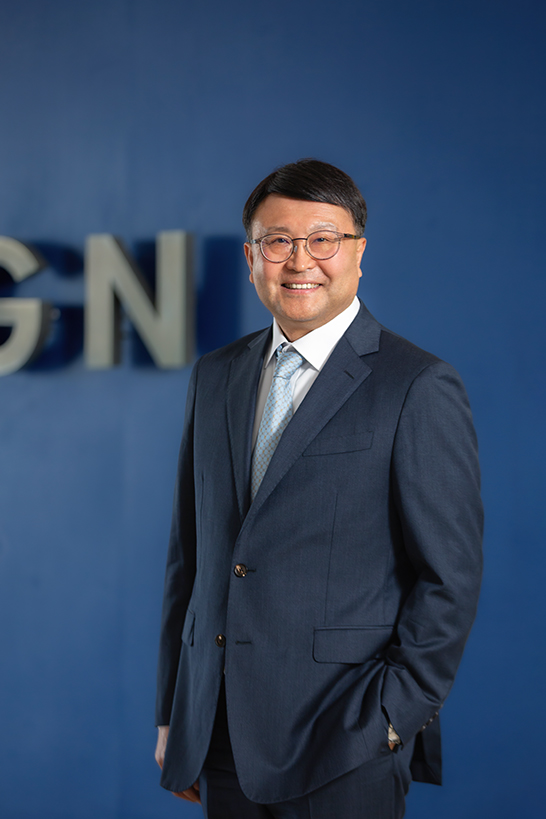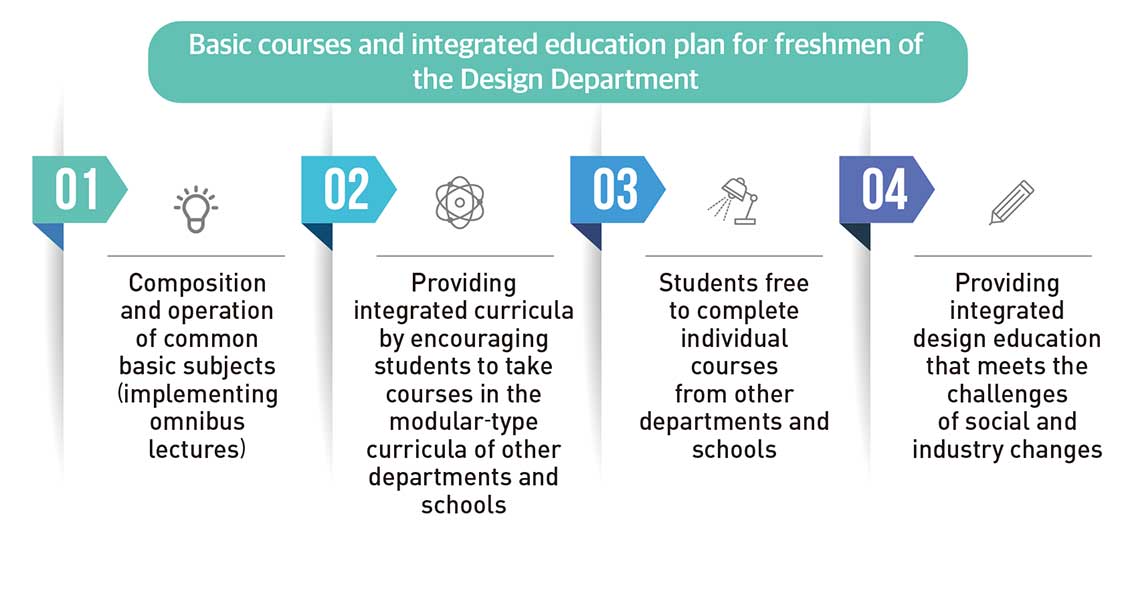THEME ③
Building a flexible education system
Enhancing the quality of education
- Written by · YeonJoo Lee
- Photo by · HongBeom Ahan

Integration of global culture and commerce -
Implementing new innovations

Dean JaeBok Lee of the College of Languages & Cultures
“In 2019 when I was serving as the dean of the College of Languages & Cultures, I formed the Humanities Promotion Committee and the College of International Culture Specialization Committee with professors from each college. We discussed the best ways to promote the field of humanities and develop the College of Languages & Cultures,” Said Dean Lee.
Dean Lee and professors at the College of Languages & Cultures were determined to specialize and strengthen the competitiveness of the humanities program at ERICA. Thus the Graduate School of Genre Technology and Subculture, and the Graduate School of Chinese Commerce & Area Studies were established in 2020 to differentiate the College of Languages & Cultures. The main reason for such changes was to update the College of Languages & Cultures to provide education that fits the times and reflects the needs of students. As such, the college has been working diligently to keep up with the changing needs of its students and the demands of society for capable graduates. Therefore, starting in 2025, a variety of changes and innovations will be launched.
“Since the establishment of the College of Languages & Cultures, department transfer rates hit the highest last year. Many students transferred to business & economics or social science departments. I understand that it is a good choice for students who are worrying about getting jobs after graduation. In the meantime, as a professor, I think these transfers gave me the chance to deeply reflect upon the purpose and efficacy of education and academia centered on languages and literature,” Dean Lee said.
ERICA is like many universities these days that are concerned about its identity. Dean Lee believes that the humanities and social science departments, and particularly language departments in Korean universities should have been more proactive in recognizing the changing educational realities, and should have pursued innovation earlier on. In this regard, he actively sought ways to restructure the College of Languages & Cultures and as a result was able to reorganize it into the ”College of Global Culture and Commerce (Department of Global Culture and Commerce)”. Five departments specializing in languages and literatures were integrated including the Department of Korean Language and Literature, and a modular-type curriculum was introduced, resulting in a total of six modules. The goal of the reorganization is to strengthen the balance between theory and practice by introducing the modular-type curriculum. That is, in order to boost the success rate of job procurement after graduation, the college intends to provide more relevant education.

“While departments are being integrated into the Department of Global Culture & Commerce, we are also focusing on the global capabilities of our students. We plan to actively promote exchanges, both inbound and outbound, of students by strengthening overseas exchanges and connections with universities that have already signed MOUs with ERICA,” Dean Lee said.
Since 2019, he and other faculty members have been pushing for changes in the culture and educational ecosystem of the college by consistently gathering opinions from students. As they focused on innovating the College of Languages & Cultures into more practical studies, they also sought to find ways to develop the academic ecosystem in the humanities and social sciences in a sustainable way. Consequently, convergence is expected with other academic fields and disciplines related to the Department of Global Culture and Commerce.
 Q&A with students from the College of Languages & Cultures
Q&A with students from the College of Languages & Cultures

Q1.I am concerned that the integration of language departments will undermine expertise. In addition, what changes will there be in the curriculum if various studies such as economics, commerce, and languages are provided?
A.Students can take foreign language and culture classes provided by the department through the language & culture module. In addition, the curriculum is designed to broaden student choices according to each module that is designed to assist students in planning their future careers, and improve the success rate of employment after graduation.
Q2.Why is the Department of Culture Contents and the Department of Cultural Anthropology being integrated into the College of Communication and Culture (now the College of Communication)?
A.The Department of Cultural Anthropology and the Department of Culture Contents contain various aspects of social science. For example, the Department of Cultural Anthropology consists of anthropology, archaeology, and bio, while the Department of Culture Contents is comprised of the humanities, media, marketing, and business. It is my opinion that integration and convergence with the departments under the College of Communications will create positive synergy.
Q3.Can the class of 2025 also take advantage of the teaching course, local semester system, and multi-major track?
A.As a result of the reorganization of the departments, the class of 2025 cannot take any teaching courses. However, they can take advantage of the local semester system and multi-major track. We plan to strengthen exchanges with overseas universities to create a firm identity of the school. We are currently promoting and operating the local semester system, student exchanges, and short-term/long-term education programs with universities in China, France, Japan, Belgium, etc.
“We will seek convergence to foster designers
who meet the demands of related industries.”

HyungKyu Lee, Dean of College of Design
ERICA’s College of Design, which started as a craft major in 1983, has undergone steady reorganization and growth over the years. Dean HyungKyu Lee has experienced firsthand the entire evolution of the college. Since joining the Craft Department in 1983, he has accumulated vast experience as a president of student council, an assistant, instructor, and professor. Due to his long-term experiences, he understands the necessity of the reorganization into the Design School. He also believes that the reorganization is a transformation that the College of Design must undergo.
“In the design field, boundaries are blurring and convergence is increasing. More and more design projects are being conducted in collaboration with various fields, increasingly the necessity for convergence education that offers knowledge and teaching skills to students in diverse areas. To this end, the reorganization currently underway is designed to give students more flexibility and offer them more choices in choosing their majors,” Dean Lee said.
Starting from the 2025 school year, students will receive design education in their undergraduate studies for one year after admission. Then, in their second year, they will be able to choose a specialized major based on their aptitudes. During this time, students will be allowed to choose their preferred professors and curricula, which is a new option made available thanks to cooperation among professors. Moreover, the expansion of infrastructure such as cutting-edge practice rooms and equipment in the College of Design is expected to further accelerate the convergence of disciplines.
Dean Lee commented, “The College of Design has an interdisciplinary structure that encompasses various design fields such as visual design, industrial design, film design, jewelry design, and fashion design. The integration of these fields will further promote exchanges and convergences in a more diverse manner. ERICA is equipped with a lot of high-tech engineering departments and businesses so there are many opportunities for collaboration in various fields.”
 The College of Design plans to undergo challenging reorganization to ensure students have the opportunity to choose their majors, while promoting active integration.
The College of Design plans to undergo challenging reorganization to ensure students have the opportunity to choose their majors, while promoting active integration.
For effective and practical convergence, the College of Design has established a code-sharing system for major courses through team teaching and collaborative lectures with the Department of Intelligent Robotics, the Department of Artificial Intelligence, the Department of Business Administration, and the Department of Culture Contents. In addition, the College of Design has presented roadmaps for each major to strengthen students’ expertise and specializations, and is developing a creative and convergent virtuous-cycle education model by operating detailed tracks. In this era of the 4th Industrial Revolution, design capabilities are being underscored and more focus is being placed on the ability of potential employees to use cutting-edge technologies, develop cooperative relations with others, and resolve problems in effective ways. ERICA’s College of Design also plans to strengthen its networks through user research and empathy-education by offering advanced design technology education, as well as promoting international exchanges. Both students and faculty members agreed with this vision and shared their thoughts, while Dean Lee expressed his deep gratitude for such proactive cooperation and support.
“I believe that the reorganization we are moving forward with at this time is the result of the enthusiasm and determination of all members of our College of Design. The goal is to develop into a competitive college on both the national and global stages. I am committed to ensuring that our members work cooperatively to achieve our common goals.”

 Q&A with Student from the College of Design
Q&A with Student from the College of Design

Q1.I am concerned that this integration may undermine the expertise and individuality of the College of Design.
A.In the field, it is not easy to develop capabilities with the knowledge obtained through only one major, and thus we definitely need to focus on re-education according to societal demands. Ultimately, the spectrum of design education offered at ERICA will become much wider. In addition, since students will be given the chance to choose their own major from their second year, their choice in major can be based on their own personal preferences so they can still achieve expertise.
Q2.Is the integrated undergraduate admission likely to lead to a decline in admissions?
A.Hanyang University ERICA has a ”Rainbow Department” system which supports up to 50% of the admission fee for students admitted to departments that have contributed to the university. All students at our College of Design can benefit from the Rainbow Department system. In addition, we have reorganized and expanded the admissions system to allow more students to take the entrance exam. Because there are now more opportunities for students, I believe there is no need to worry about a possible decline in admissions.
Q3.Will there be any changes to the curriculum for the class 2024 if they take a leave of absence or return to school?
A.If members of the class of 2024 take a leave of absence, the 2025-28 curricula will apply to them. However, we will support them to ensure that they do not suffer any disadvantages, by offering alternative courses, counseling opportunities, and career guidance.





